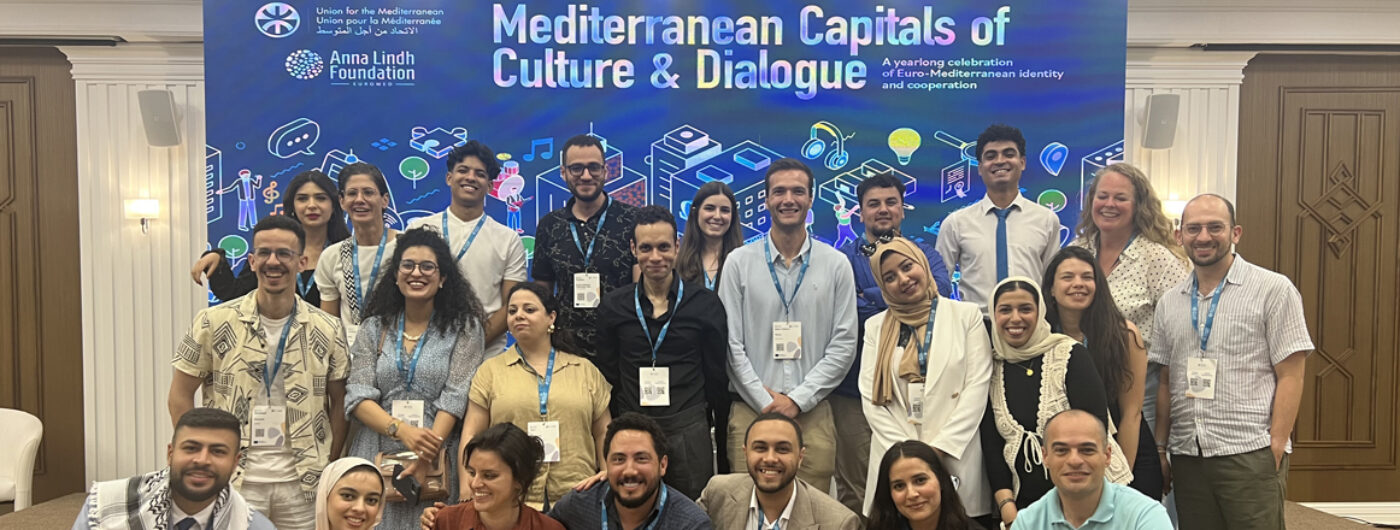
UfM promotes culture and knowledge as pillars of dialogue at ALForum in Tirana
18-20 June 2025, Tirana, Albania. –The Union for the Mediterranean (UfM) reinforced its commitment to intercultural dialogue and regional cooperation by co-organising key sessions at the Anna Lindh Foundation’s ALForum 2025 in Tirana. Through its participation, the UfM highlighted the central role of cities, creative communities, and academic cooperation in fostering shared values across the Euro-Mediterranean region.
Highlighting cities as drivers of dialogue and inclusion
On 19 June, the UfM and ALF co-hosted the session “Mediterranean Capitals of Culture and Dialogue: Cities Leading Intercultural Transformation.” The discussion that counted with the participation of UfM’s Coordinator for the initiative, Mr Ayman Elsherbiny, brought together representatives of cities awarded the MCCD title. Tirana (2025 Mediterranean Culture Capital, alongside Alexandria), was represented by Mr Genci Khojdeli, General Director of Integration, Strategic Planning and Economic Development, and Ms Mirela Kocollari, General Director of City Promotion for Art, Culture, Sport, and Tourism. Ms Rita Orlando, Head of Programs and Networks at Fondazione Matera Basilicata 2019, spoke on behalf of Matera, which will share the title with Tétouan in 2026.
Speakers exchanged experiences on how cities can develop sustainable cultural programmes that strengthen social cohesion and promote intercultural understanding in the Euro-Mediterranean region. They explored ways to embed intercultural dialogue into local policies and to engage civil society, creative sectors, and educational institutions in designing activities that reflect both Mediterranean diversity and pride in local identity. Representatives from the city of Córdoba also attended, expressing their interest in applying for the title of Mediterranean Capital of Culture and Dialogue in 2027. Matera proposed launching a dedicated network of Capitals to ensure sustained collaboration, inspired by the European Capitals of Culture model.
The MCCD initiative drew the attention of high-level figures, including Princess Rym Ali, President of the Anna Lindh Foundation, Mr Edi Rama, Prime Minister of Albania, and Mr Igli Hasani, Albania’s Minister of Europe and Foreign Affairs. In their interventions, they underscored the potential of the Mediterranean Capitals of Culture and Dialogue to create vibrant spaces for conversation and cooperation in a complex geopolitical context. Prime Minister Rama emphasised that courageous and dignified dialogue is essential to disarm hatred and counter ignorance.
Promoting creative narratives through the Mediterranean Capitals
The UfM also launched the “MCCD Communication Activation Programme,” coordinated in Tirana by Yasmine Ketfi, UfM Communications Officer, bringing together 19 content creators and communicators from 11 Mediterranean countries: Albania, Algeria, Egypt, Italy, Jordan, Lebanon, Morocco, Palestine, Spain, Syria, and Tunisia. Through informal exchanges and a dynamic brainstorming session, participants explored how to make the Mediterranean Capitals a truly people-centred initiative by producing stories rooted in everyday experiences — from city soundscapes to cross-border creative collaborations. The programme highlighted the importance of engaging younger and diverse audiences through authentic, relatable narratives.
Inclusivity and ethics emerged as key themes throughout the discussions, with participants stressing the need to represent rural and minority communities, to involve local voices in editorial processes, and to remain mindful of regional sensitivities in storytelling.
Supporting academic partnerships for dialogue
In the session “Knowledge for Cohesion: Academic Cooperation for Dialogue and Inclusion in the Euro-Mediterranean,” moderated by João Lobo, Project Analyst at the UfM Higher Education and Research Division, speakers explored the role of academic institutions in advancing inclusive knowledge. Discussions addressed ways to foster research partnerships grounded in ethical standards, openness, and active engagement with communities. Speakers emphasised collaboration between universities, local authorities, and civil society to produce research supporting social cohesion and countering misinformation.
The UfM will build on the outcomes of the ALForum to strengthen creative and academic initiatives that promote intercultural dialogue and inclusive narratives. In particular, the UfM will work with partners to support future editions of the Mediterranean Capitals of Culture and Dialogue and to advance frameworks for academic cooperation contributing to regional cohesion.
The Mediterranean Capitals of Culture and Dialogue, jointly led by the UfM and the Anna Lindh Foundation, remain a key initiative for fostering dialogue, mutual understanding, and collaboration across the Mediterranean.

